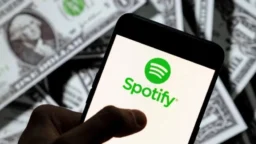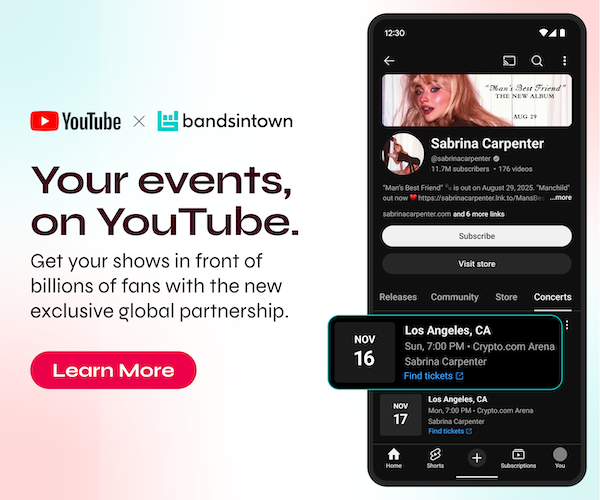Sony ATV Chairman and CEO Martin Bandier received the NARAS President’s Merit Award at the pre-Grammy Gala in Los Angeles over the weekend, and used the occasion to articulate why he continues to fight so fiercely for the rights of songwriters.
Bandier has been a vocal proponent for change in the way that songwriters are paid in the US. He has lambasted the likes of Pandora for paying songwriters minute royalties, while also advocating an increase in the percentage of payouts writers receive from ‘all you can eat’ streaming services such as Spotify.
In addition, Bandier has been the leading agent for change regarding the current inability of publishers to strike direct licensing deals with services in the US for their digital performance rights.
In June 2014, the US Department Of Justice commenced a review of the ‘consent decrees’ of BMI and ASCAP after Sony/ATV, Universal Music Publishing, Kobalt and others moved to withdraw certain negotiating rights concerning digital radio from the two collection bodies. Yet as it stands, all such deals must still be handled by giant PROs like ASCAP and BMI.
“The entire livelihood of a songwriter is reliant on the income from the song – and that proposition is now under threat in a way that it has never been before”
Martin Bandier, Sony/ATV
Collecting his President’s Award, Bandier told an audience of his peers of his belief that, historically, songwriters had “never got the credit they deserve” – and that was never more true than in 2015.
He reminded those listening that, unlike artists, songwriters didn’t “share lucrative touring revenue [or] do brand deals” to compensate for a lack of income elsewhere.
Prior to Bandier picking up the gong at The Beverly Hilton in Beverly Hills, California, a specially-created tribute video was shown starring the likes of Taylor Swift, Pharrell Williams, Lady Gaga, Iggy Azalea, Sting, Pitbull and Motown founder Berry Gordy.
You can read Martin Bandier’s acceptance speech in full below.
Thank you.
First, I want to thank my good friends David Steinberg and Alan Zweibel who put together the very funny and supposed tribute video. Unfortunately, it seems they took me too literally when I said, “You don’t have to make me look good and you can poke fun at me.” I’m not sure what part of the video actually paid tribute to me.
On a serious note, I would like to thank Neil Portnow and the Academy – I’ve always wanted to say that! So thank you to the Academy. Thank you Clive Davis, my wife Dorothy and my children Alison, Jennifer and Max for allowing me to indulge myself in my passion for music and songwriters.
I would be remiss if I didn’t also mention that I have been part of two great companies that have supported me over many years. So I would like to take this opportunity to thank everyone I have worked with at EMI and all my colleagues I have worked with these past eight years at Sony/ATV, Sony Corporation of America and Sony Corp.
But, as the first music publisher to receive this award, I would especially like to thank the songwriters. This includes not only those songwriters I have worked with and developed close relationships with over the years, but also those I have never met and those who came before me but whose words and music will nonetheless live forever.
“Songwriters are not being adequately compensated for their creations in today’s digital world. Their songs are the very reason [streaming] services exist.”
Looking back, it’s hard to remember a time when I wasn’t obsessed by songs. As a young child I took piano lessons and hated them. But it was going to the movies at least once or twice a week with my grandmother, which sparked my passion for songs and music. And, yes, movies did have sound, even back then.
In those days the music business was very much aligned with the movie business and, while I would have preferred to have seen a Western or an action movie, my grandmother usually opted for a musical. It meant I got to see all of those great musicals from the likes of MGM and United Artists – and in my wildest dreams I never would have imagined that one day I would publish all of those amazing songs.
While most people had left the theater, I chose to stay right until the end credits had finished just so I could catch the names of the artists who had performed the songs and, equally as important, those who had written them.
While I was growing up, my brother, who is 10 years older than me, was another big influence. He listened to a lot of swing music so I got to know all the songs that were made popular by the swing bands and their artists as well as the songs that came from the Great American Songbook.
And then Elvis came along and everything changed, including my musical tastes. Suddenly I embraced Elvis, doo-wop, the music of the Brill Building, The Beatles and, of course, my favorite, Motown. But I was always just as interested in the song itself as I was the performer. To me it was Leiber & Stoller and Elvis; Holland-Dozier-Holland and The Supremes; Goffin & King and The Shirelles. I think that is still true today.
Unlike other forms of art – and to me there is no doubt songwriting is an art form – few people know who created a classic song, unless it is the performer. Everyone knows who wrote The Great Gatsby or painted the Sistine Chapel, but if you asked someone about “Somewhere Over The Rainbow”, while they would probably tell you Judy Garland sang it very few would know it was written by Harold Arlen and Yip Harburg.
That is why I have always felt that songwriters have never received the credit they deserve. This is particularly the case today when something like 95% of the songs on the Billboard Hot 100 chart are written in whole or part by someone other than the performer. A songwriter doesn’t share lucrative touring revenue and they don’t do brand deals. Their entire livelihood is reliant on the income from the song and that proposition is now under threat in a way that it has never been before.
“Songwriters have inspired me all these years. I have made it my No.1 priority to ensure they are fairly paid for what they do.”
The music industry is changing in ways that I could never have imagined even just a decade ago; it is exciting for us that this has resulted in music lovers having new ways to listen to music as they move from CDs and digital downloads to streaming services. But it is also the case that songwriters are not being adequately compensated for their creations in today’s digital world. Their songs are the very reason these services exist; their songs are why we are all here tonight. As the saying goes, it all starts with the song.
While I am honored that this award is celebrating my own success, I would not be here tonight without the songwriters who I have cared for and worked with. They and their songs have inspired me all these years. And it is because of them that I have made it my No. 1 priority to ensure they are fairly paid for what they do.
In many ways, I am still that little boy, who sat in the movie theatre, watching the end credits roll, anxious to read the titles of the songs and acknowledge those who wrote them as well as those who performed them. That was exciting for me back then, and it is equally as exciting today.
So, while this honor has been given in my name, it is really about the songwriters and what they do. So thank you once again for this award. This is very important to me and I am very proud to receive it.Music Business Worldwide





